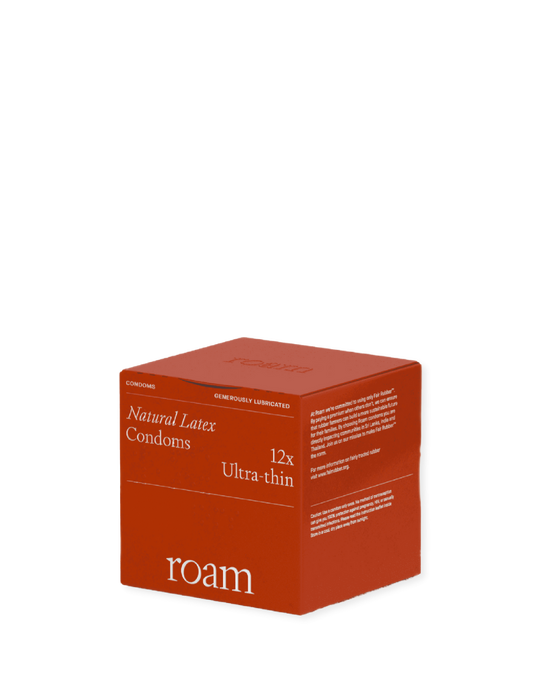Your Complete Guide To Contraception
From IUDs and pills to implants and dams, the list of contraceptive methods is vast and it can be a confusing world to navigate, whether you’ve just become sexually active and you’re weighing up your choices or you’ve been flitting from option to option trying to find a contraceptive method that works best for you.
There’s no “one-size-fits-all” method for contraception, as is the same with pretty much any aspect of health - if you’ve experienced your friends raving about how great a certain contraceptive is only to try it and find that it’s the worst thing you’ve ever used, you’ll know exactly what I mean!
This guide is here to hold your hand whilst you traverse the mass of contraceptive options out there and attempt to figure out which one works best for you: we’re going to take a look at what you should consider before choosing a contraceptive option whilst also taking a look at the different options you have out there, with pros and cons list attached for each!
What Should You Consider Before Choosing A Contraceptive Method?
Whether you’re wanting to change the contraceptive method you’re using or you’re looking for your first type of contraception, there are a few things you should think about before deciding which type is best for you: then, once you’ve defined these things, you can rule out which ones won’t suit you and hone in on the ones that might!
So, what should you be considering when it comes to choosing a contraceptive method?
If You Are Committed To Doing Something Daily
Whilst there may be a whole host of contraceptive options out there, you can generally categorise the most commonly used ones into two specific groups: ones that you have to take or use daily and ones that require no regular action. For example, you have to take the contraceptive pill on a daily basis to ensure it’s effective (at the same time every day if possible!).
So, are you someone that can commit to remembering to take something daily? If you aren’t, don’t kid yourself into believing you can: there’s nothing worse than having to wonder about whether took your pill or not after having sex (queue the counting of the spaces in the pill box and rush to the pharmacy for backup!).
So, make sure you think about whether you can commit to taking your contraceptive daily - if you can’t, it’s best to go for a method that allows you to be slightly more passive!
If You Want Something Long-Term
Contraceptive methods can provide protection for a singular sexual experience or they can provide you with protection, in some cases, for up to 10 years. Although you can stop using/remove a contraceptive method at any time it isn’t working for you (apart from certain ones, such as the injection), it’s a good idea to think about whether you’re looking for short or long-term protection from your contraceptive method.
Although not always the case, people generally tend to look into more long-term contraceptive options if having regular sex and shorter-term methods if having sex irregularly. So, it’s certainly something to think about.
If You Want It To Help With Other Health Issues You May Have
Certain contraceptive methods not only help you stay protected from pregnancy but they can also help reduce the symptoms associated with specific health conditions or reduce the severity of conditions. For example, IUDs are often recommended for those suffering from heavy bleeding due to endometriosis and certain types of pills may reduce the severity of acne. Therefore, if you are someone that struggles with conditions that you know may be helped by choosing a specific contraceptive method, you may be more inclined to think more seriously about that type of method.
5 Different Types of Contraceptives
Whilst there are more than 5 different types of contraceptive methods (no, this doesn’t include the “pull-out method”, don’t fool yourself, it’s not worth it!), we’re going to take a look at 5 of the most commonly used types of contraceptives out there.
The Pill (Combined Oral and Progestogen-only)
Whilst “the pill” is the term typically used to describe both the combined and progestogen-only pills, they both differ.
The combined oral pill is more commonly provided than the progestogen-only pill - this type of pill contains artificial versions of both hormones oestrogen and progesterone and one pill is taken for 21 days until a 7-day break occurs and then the 21 days restarts. It works by preventing the ovaries from releasing an egg every month.
The progestogen-only pill, on the other hand, is taken without a break and needs to be taken every day to work - this is typically within the same 3-hour window every day. It works by thickening cervical mucus and therefore preventing sperm to reach an egg.
Pros:
- There’s no procedure or insertion of anything into the body.
- Can reduce acne, and PMS, and may lighten periods.
- Specific to the progestogen-only pill: useful if you cannot use other contraceptives with oestrogen.
Cons:
- Requires you to take a pill daily (with the progestogen-only pill this is a tight schedule) and monitor your use of it.
- May cause side effects (especially initially) such as nausea, weight gain, and mood swings.
- May not be effective if you are sick or have diarrhoea.
The IUD or IUS (Copper and Hormonal)
An IUD is known as an intrauterine device and is a copper coil and an IUS is an intrauterine system and is a hormonal T-shaped device.
Although the IUD and IUS work differently, they follow the same concept, they’re fitted the same and have the same (or very similar) pros and cons attached to them.
An IUD is a small copper and plastic T-shaped device placed into the uterus by a doctor that stops you from getting pregnant for between 5-10 years. An IUS is a small plastic T-shaped device placed into the uterus by a doctor that releases the progestogen and protects you from pregnancy for between 3 to 5 years.
It’s important to note that the time in which an IUD or IUS will be effective against pregnancy depends on the specific type or brand used - this should always be confirmed by the doctor before insertion.
Pros:
- Provides long-term protection and is one of the most effective methods of birth control.
- May reduce symptoms of chronic conditions such as endometriosis.
- IUDs don’t produce hormonal side effects.
Cons:
- Requires insertion which may be painful.
- Periods may become irregular, stop, or even in some cases, become heavier.
- Infections are more likely to become complicated when you have an IUD fitted and may lead to a more serious infection if not properly treated.
The Implant
The implant (the brand most typically used is Nexplanon) is a small flexible piece of plastic that's placed under the skin in the upper arm area and releases progestogen into the bloodstream. The implant can be effective at preventing pregnancy for up to 3 years.
Pros:
- Provides long-term protection.
- May help to reduce period pain and heavy periods.
- Useful if you cannot use other contraceptives with oestrogen.
Cons:
- There’s a small procedure to insert the implant into the upper arm.
- Can increase the likelihood or severity of acne, headaches, nausea, and mood swings.
- May cause spotting or irregular periods (especially initially, for up to 6 months).
The Injection
The contraceptive injection (provided under different brand names) releases progestogen into the bloodstream to prevent pregnancy, just as the implant does.
Most injections last for 13 weeks, with certain brands only lasting 8 weeks.
These injections are most commonly done into your buttocks, but you can also be injected into the upper arm. In most cases, doctors and nurses administer these injections, but a new type of injection has recently been brought to the UK called Sayana Press and you can be taught how to give yourself these injections.
Pros:
- May reduce period pain and PMS.
- Allows you to be protected for 8-13 weeks.
- Useful if you cannot use other contraceptives with oestrogen.
Cons:
- Cannot be removed from the body if you experience side effects.
- May cause a delay of up to 1 year for periods and fertility to come back after even just one injection.
- Can cause irregular periods, mood swings, headaches, and nausea.
Natural Family Planning
You don’t always need to put, take, or inject anything into your body to protect yourself from pregnancy, and a lot of women are ditching the more medical methods of birth control for natural family planning.
Natural family planning involves tracking your menstrual cycle, keeping a record of your temperature and cervical fluids, and using extra contraceptive protection if you do not want to get pregnant during the times when you may be able to.
It typically takes between 3 - 6 months for people to be able to naturally and effectively track their menstrual cycles to utilise this contraceptive method.
This method of contraception is less effective than the others listed above and therefore needs to be taken much more seriously and requires more effort on your behalf.
You should still visit your sexual health clinic, doctor, or nurse to learn about natural family planning before you start going forward with this contraceptive method.
- There’s no procedure, insertion of anything, or any hormones being added into the body.
- Doesn’t cause any side effects.
- They help you become more in tune with your body and bring a partner(s) into the contraceptive method.
Cons:
- Requires daily action, tracking, and thought.
- Not as effective as other methods if not done correctly.
- Takes between 3 - 6 months to be able to effectively track the menstrual cycle.
Choose What’s Right For You
Your contraceptive method is your choice and it can be incredibly empowering to not just learn more about the different types of contraception out there, but actively choose which methods you want to use. Take your time, hit up the sexual health clinic, speak to medical professionals, and try to enjoy educating yourself about your body and your choices.
Just remember, contraceptives don’t protect you from STIs, so don’t forget to keep using extra protection!
Disclaimer: this article is here for educational purposes only and we are not giving active advice. You should always seek the advice and support of medical professionals if you want to learn more about contraceptive methods or have health concerns related to your contraceptive health. Additionally, for the purpose of this article, we may be generalising when it comes to discussing the pros and cons of contraceptives - it’s therefore important to understand that since everyone is unique, each person will react to each method differently.












